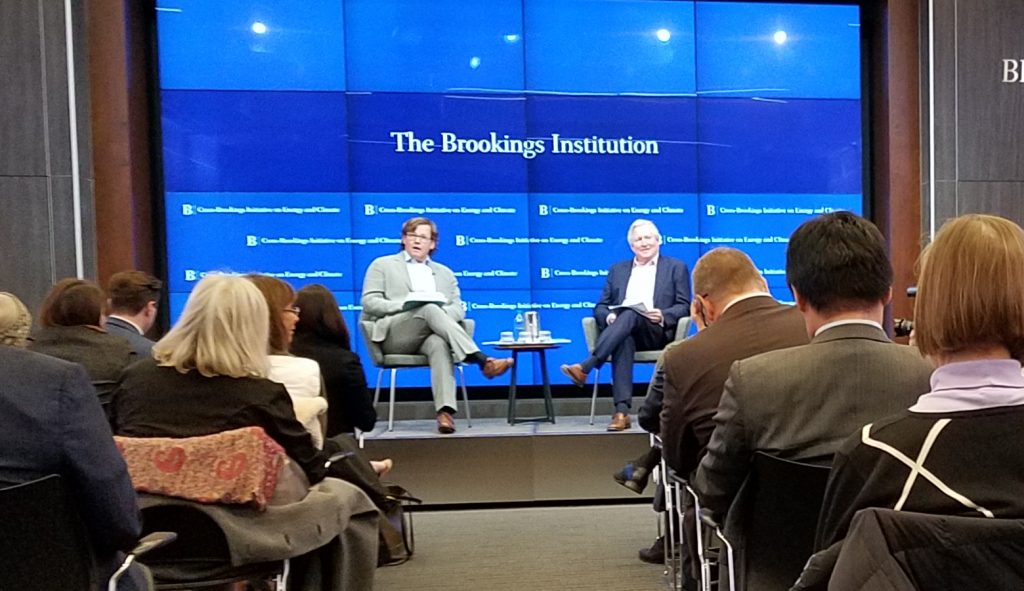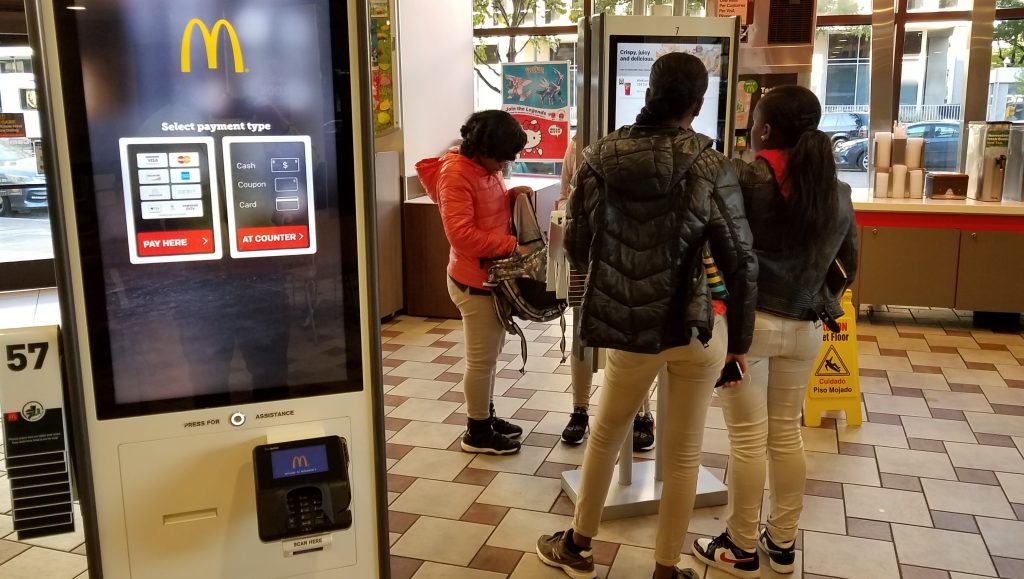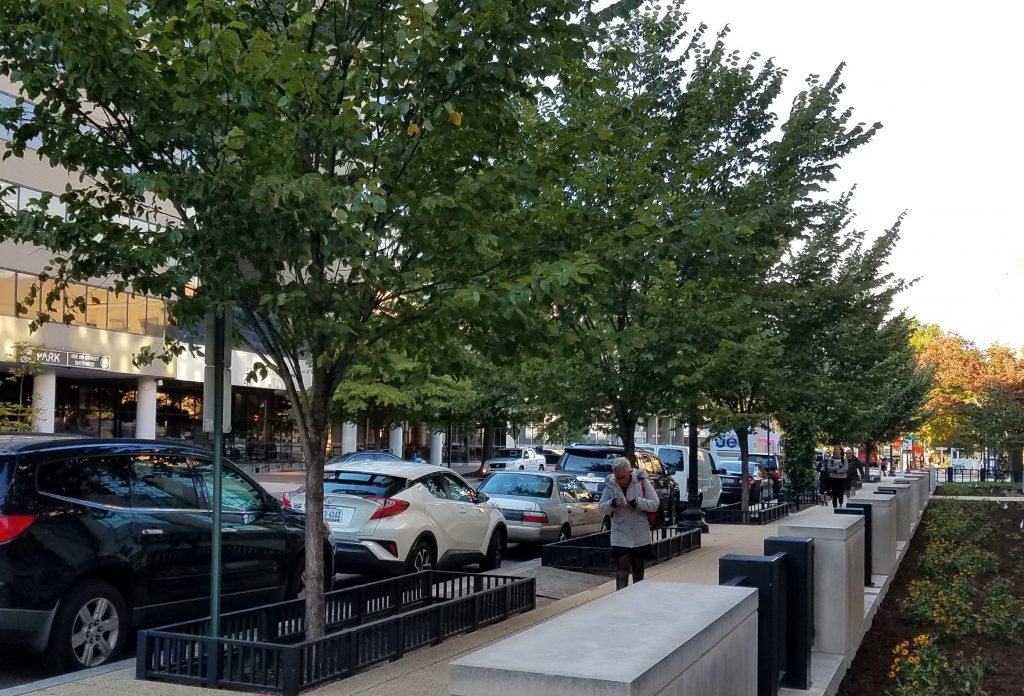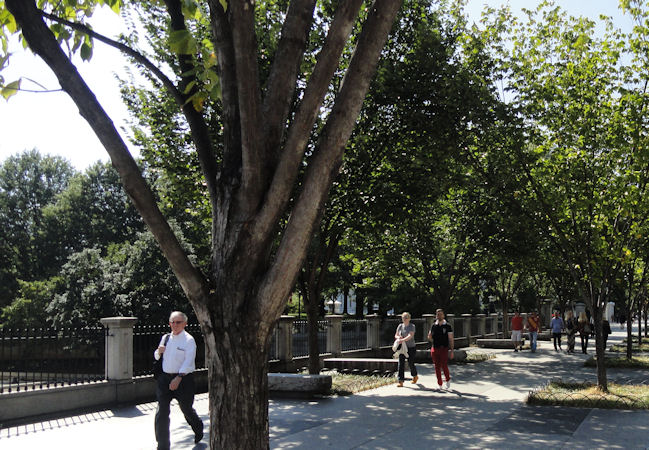
America was plunged into an energy crisis soon after I graduated from HS, so besides drinking way too much beer as a freshman at University of Wisconsin Stevens Point, I was occupied with forestry and energy. I try to go to energy related programs at Brookings, AEI or Wilson and so I went today to “The new dynamics of global energy and climate: A conversation with Exelon CEO Chris Crane.” Exelon is the largest electric parent company in the United States by revenue, the largest regulated utility in the United States with approximately 10 million customers, and the largest operator of nuclear power plants in the United States.
Mr. Crane talked about his firm’s vision which includes providing reliable power and cutting carbon emissions. He said that you can believe in climate change or not, but that firms like his have to adapt to it because it is happening. To stave off the worst of climate change the USA will need to drop carbon emissions by 80% by 2050. This is a tall order. The electrical sector is off to a good start. We are down 25% based on 1990 figures, but it may get harder to do. This was done largely by substituting natural gas for much dirtier coal. Nobody really anticipated the big supply of cleaner and cheaper natural gas. We cannot count on that sort of good luck again.
Renewables like solar & wind are coming along very well, but they do not supply the base loads.
There are times when the wind doesn’t blow, and the sun doesn’t show. Base loads for the time being can be supplied only by fossil fuels, hydro or nuclear. Exelon is the largest operator of nuclear power plants. The nuclear power plants are losing money. They cannot compete with cheap natural gas, but they have a big advantage in that they do not emit CO2. If these plants went off line, CO2 emissions would necessarily rise. This is what happened in Germany. In their rush to be green, they shut down nukes and dirty coal plants took up the base-load task. There is currently a social benefit to keeping the nukes in business.
As a result, German CO2 emissions actually went up not in spite of but BECAUSE of their green movement.
Carbon taxes – the good, the bad & the unlikely
Exelon supports carbon taxes, specifically the Baker-Shultz plan (I have written about this on other occasions). Crane thinks that only market driven plans have a real chance for success. We should look to outcomes, rather than back any particular technology and let various techniques compete. We do not know which will be best, or maybe what combination will be most effective.
Challenges include developing better electrical storage and connecting pipelines and power lines. New England is at risk, for example, because activists have opposed and effectively shut down construction of electric transmission lines that could bring Canadian hydro-power and gas pipeline expansion to bring abundant American natural gas to the region. Ironically, Exelon power plants in New England that use natural gas need to import LNG, and these imports come from Russia.
Hydrogen economy – perpetually five years in the future
The talk ended on a hopeful note. Crane talked about the hydrogen economy. This is not a new idea, but its accomplishment seems always to be five years away. Hydrogen is a perfect fuel. It burns cleanly, with the only emission being water vapor. The problem is that hydrogen really is not a fuel source, but more a storage medium. Hydrogen exists nowhere in nature in a pure form. It must be made. The most ecological method would be to divide it from oxygen in water. H2O is made of hydrogen and oxygen and it the most common thing on the earth’s surface. But separating the H from the O takes lots of energy. A process might be to use solar to make hydrogen when the sun is shining and then to use this hydrogen in fuel cells to make energy when it is dark.
My first picture is from Brookings. The program was from 2-3:30. This makes a difference to me. I ride my bike down, but I prefer to take the Metro back, since it is uphill and I am tired. I can take the Metro before 3 or after 7, so I had to hang around until 7. Fortunately, there are nice places to hang. The next picture and the video show the Botanical Garden, a great place to hang around. Notice the longleaf and lobolly pines. After that are some elm trees near the old USIA and last shows the kiosk at McDonald’s. You order electronically and then they bring your order.





